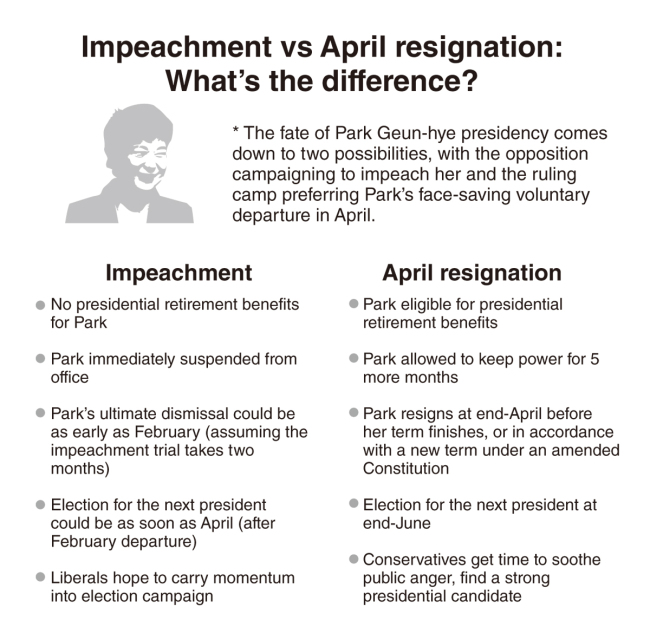
Their rationale is that the president’s self-directed resignation is no different from her being impeached, or that it could in fact be a salutary plan as it guarantees her departure from power by a given date, unlike impeachment which faces several more steps to take effect.
What this argument misses out, however, is that the disputed state chief will be sidestepping a number of inconveniences, should she be allowed a voluntary departure.
The most imminent difference is whether or not she will immediately be suspended from the country‘s highest office, upon which she is to lose her immunity to criminal liability for irregularity charges.
If impeached, Park‘s presidential powers are immediately suspended until the Constitutional Court decides between her ultimate removal or reinstatement.
The resignation plan, though it states that the president should hand over practical power to the prime minister as a transition measure, means that she will continue to hold power for five more months.
The two scenarios also lead to a different timeline for the next presidential election to choose Park’s successor.
In case of resignation by late April, the presidential race is likely to be held around June. Political parties will have about five months to single out their candidate and prepare for a campaign.
With impeachment, an election would be held earlier. Park’s ultimate dismissal could come as early as February, which means that the election would take place in April.
Despite the uncertainties of the possibility and consequent political timeline, there is yet another reason for the opposition circles -- and the angered public -- to push ahead with impeachment.
Impeachment, being the only way to legally sanction a standing president, is to deprive Park of several of the privileges which she may otherwise enjoy after stepping down.
The Act on Honorable Treatment of Former Presidents entitles former presidents to a number of benefits -- all of which are to be suspended, should he or she be driven out of the post by impeachment, face imprisonment for a crime or expatriate to another state.
The financial advantages range from pension, medical fees, transportation expenses, telecommunication costs, as well as state-funded private security services and personal assistants.
The affiliated enforcement ordinance states that a former president may receive a yearly pension of up to 8.85 times the monthly salary of the incumbent president at the time of payment. Upon this rule, former presidents are generally to receive about 50 percent of their salary during their time in office.
Park, whose yearly salary is 212 million won ($181,000), will thus be given about 148 million won after retirement or resignation.
This amount would have been inherited to Park’s spouse or children, had she been married or had children.
Last year, a budget of 20.1 billion won was used to support former presidents and their families, according to the Ministry of Interior.
The current beneficiaries include former President Lee Myung-bak and the bereaved families of Roh Moo-hyun, Kim Dae-jung and Kim Young-sam. Other former presidents have been excluded from the list due to their post-term criminal charges.
By Bae Hyun-jung (tellme@heraldcorp.com)
-
Articles by Korea Herald



![[AtoZ into Korean mind] Humor in Korea: Navigating the line between what's funny and not](http://res.heraldm.com/phpwas/restmb_idxmake.php?idx=644&simg=/content/image/2024/04/22/20240422050642_0.jpg&u=)
![[Exclusive] Korean military set to ban iPhones over 'security' concerns](http://res.heraldm.com/phpwas/restmb_idxmake.php?idx=644&simg=/content/image/2024/04/23/20240423050599_0.jpg&u=20240423183955)



![[Graphic News] 77% of young Koreans still financially dependent](http://res.heraldm.com/phpwas/restmb_idxmake.php?idx=644&simg=/content/image/2024/04/22/20240422050762_0.gif&u=)
![[Herald Interview] Why Toss invited hackers to penetrate its system](http://res.heraldm.com/phpwas/restmb_idxmake.php?idx=644&simg=/content/image/2024/04/22/20240422050569_0.jpg&u=20240422150649)






![[Exclusive] Korean military to ban iPhones over security issues](http://res.heraldm.com/phpwas/restmb_idxmake.php?idx=652&simg=/content/image/2024/04/23/20240423050599_0.jpg&u=20240423183955)



![[Today’s K-pop] Ateez confirms US tour details](http://res.heraldm.com/phpwas/restmb_idxmake.php?idx=642&simg=/content/image/2024/04/23/20240423050700_0.jpg&u=)